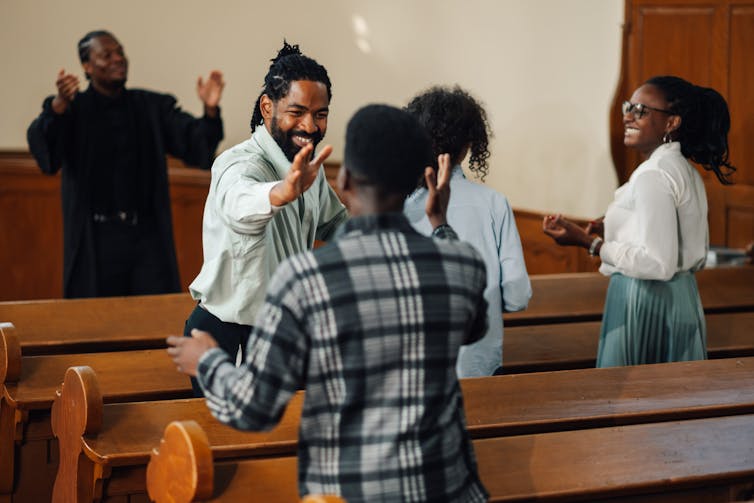Do you keep in mind the COVID-19 shutdowns?
Many Individuals might now not do the actions they loved as soon as companies, faculties, church buildings, gyms and neighborhood organizations shut their doorways. Even spending time with family and friends turned almost unattainable.
Now think about residing that sort of isolation on a regular basis.
For tens of millions of Individuals with critical psychological well being circumstances, being unable to interact in significant actions is not only a brief disaster – it’s day by day life.
Group inclusion refers to everybody’s proper to take part in significant social roles. This contains working, going to highschool, training one’s religion or just connecting with others in shared actions.
But, for the estimated 15.4 million U.S. adults residing with vital psychological well being circumstances – about 6% of the grownup inhabitants – neighborhood inclusion is much from assured. In contrast with the final inhabitants, they’re far much less prone to be concerned in social actions that deliver goal and connection, in addition to well being advantages.
I’m a psychologist who has labored in inpatient and outpatient psychiatric settings, and I directed a federally funded analysis and coaching middle at Temple College in Philadelphia for greater than 20 years that focuses on unbiased residing and participation of individuals with critical psychological diseases.
My colleagues and I’ve performed analysis which demonstrates that folks with such circumstances wish to take part of their neighborhood similar to everybody else. We additionally discovered that they will achieve this – with correct helps like drugs, remedy, rehabilitation companies and communities making affordable lodging for them. And moreover, they need to: Group inclusion is sweet for his or her well being.
Advantages of neighborhood life
Group involvement will get individuals with psychological sickness away from bed and out of the home. It encourages motion and exercise, which reinforces bodily well being.
That is particularly crucial as a result of individuals with critical psychological diseases die 15 to twenty years sooner than the final inhabitants – usually resulting from preventable diseases like diabetes, most cancers and heart problems.
Common participation in life’s routines supplies social and emotional stimulation that additionally boosts cognitive functioning, like reminiscence and problem-solving, and reduces despair and loneliness.
Group involvement is sweet for bodily and psychological well being.
Namthip Muanthongthae/Second Assortment through Getty Photographs
What actually causes exclusion
Some individuals might assume that folks with extreme psychological diseases are restricted from energetic participation of their communities solely as a result of psychological well being signs themselves.
For instance, they may suppose that cognitive points associated to schizophrenia make it too tough for individuals to work or go to highschool; or that mania, anxiousness and despair forestall them from having good relationships with others.
However setting additionally performs a significant position.
The social mannequin of incapacity means that individuals are not disabled by their prognosis. As a substitute, they expertise a incapacity via limitations of their communities due to bodily, structural and social obstacles.
For instance, somebody with anxiousness or despair could also be penalized in a school class that deducts factors for college students who don’t converse up.
An individual with a incapacity that causes fluctuating moods or low power may not reach a inflexible nine-to-five job with out lodging.
And a churchgoer who talks to themselves or has to stroll round throughout companies as a result of their drugs make them jittery – a situation known as akathisia – or who is thought to have been recognized with schizophrenia is perhaps requested to depart as a result of their presence makes others uncomfortable.
The result’s that individuals are unable to take part not merely due to an impairment, however due to an setting that doesn’t accommodate or admire their distinctive attributes.
Serving to individuals with psychological sickness rejoin neighborhood life
Some applications right here in Pennsylvania are working to alter that.
Schooling Plus helps Philadelphia residents with psychological well being circumstances full school and monetary assist software kinds, acquire college lodging for his or her incapacity, and develop good examine habits or be taught to ask for assist from their instructors.
Pathways to Housing PA gives transitional job alternatives to individuals who have been homeless, and organizes picnics, journeys to Phillies baseball video games and different enjoyable actions that create a way of neighborhood belonging.
A voter entry initiative at an inpatient psychiatric facility in Pennsylvania helps sufferers test their voter registration standing, register to vote and apply for mail-in ballots.
The nonprofit Compeer in suburban Philadelphia connects neighborhood volunteers to individuals with psychological diseases to interact in mutual leisure or instructional pursuits. This oftentimes results in long-term friendships.
And a present examine I’m conducting is inspecting methods to help religion communities in Montgomery County to be extra welcoming and embracing of people with psychological diseases.

Church buildings and different religion communities can welcome members with psychological diseases by accepting their totally different behaviors.
zamrznutitonovi/iStock/Getty Photographs Plus through Getty Photographs
What you are able to do
Members of the family, associates and psychological well being professionals can merely ask individuals with psychological diseases about their pursuits – whether or not it’s employment, going to highschool, relationship or making new associates – after which encourage and help them in pursuing these pursuits.
Creating inclusive communities means not simply providing companies to individuals with critical psychological sickness, but additionally altering damaging beliefs and behaviors towards them. This contains embracing individuals who may categorical feelings in a different way, require flexibility or just behave in methods we’re not used to.
For instance, say you’re in a espresso store and encounter an individual who’s muttering to themselves and will not have bathed in a number of days. Perhaps you make eye contact, smile and say good day. Actually rethink complaining.
It takes empathy, open-mindedness and persistence to create a neighborhood that welcomes individuals with psychological sickness and will increase the chance that they will take part in society like everybody else.



